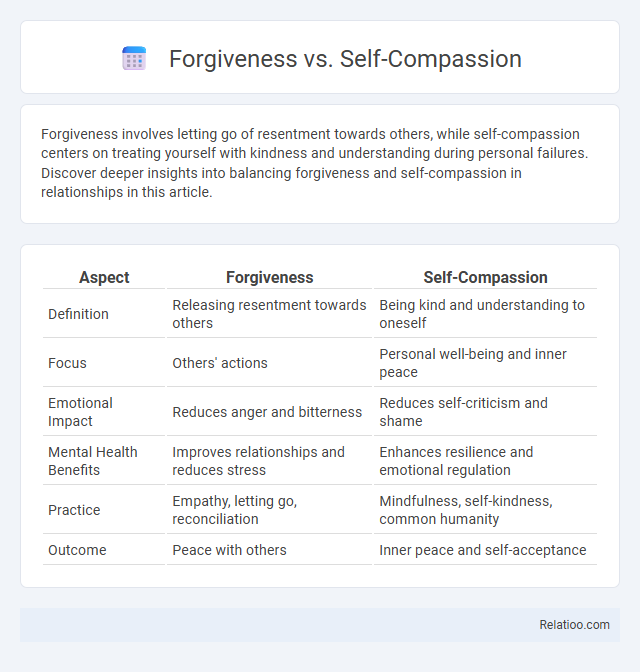Forgiveness involves letting go of resentment towards others, while self-compassion centers on treating yourself with kindness and understanding during personal failures. Discover deeper insights into balancing forgiveness and self-compassion in relationships in this article.
Table of Comparison
| Aspect | Forgiveness | Self-Compassion |
|---|---|---|
| Definition | Releasing resentment towards others | Being kind and understanding to oneself |
| Focus | Others' actions | Personal well-being and inner peace |
| Emotional Impact | Reduces anger and bitterness | Reduces self-criticism and shame |
| Mental Health Benefits | Improves relationships and reduces stress | Enhances resilience and emotional regulation |
| Practice | Empathy, letting go, reconciliation | Mindfulness, self-kindness, common humanity |
| Outcome | Peace with others | Inner peace and self-acceptance |
Understanding Forgiveness: Definition and Key Concepts
Forgiveness involves consciously letting go of feelings of resentment or anger toward oneself or others, promoting emotional healing and mental well-being. Key concepts include acknowledging hurt without condoning harmful behavior, fostering empathy, and decoupling forgiveness from forgetting or excusing offenses. Understanding forgiveness as a deliberate, restorative process contrasts with self-compassion, which centers on kindness toward oneself, and anxiety, which often amplifies negative emotions and hinders emotional regulation.
What Is Self-Compassion? Core Principles Explained
Self-compassion involves treating Yourself with kindness and understanding during times of failure or distress, rather than with harsh judgment. Its core principles include self-kindness, recognizing shared humanity, and mindfulness, which together help reduce anxiety by promoting emotional resilience. Unlike forgiveness, which often focuses on others, self-compassion centers on nurturing Your own well-being and alleviating internal suffering.
The Psychological Benefits of Forgiveness
Forgiveness reduces stress and promotes emotional healing by releasing negative emotions such as anger and resentment, which can exacerbate anxiety. Research shows that practicing forgiveness enhances your mental well-being, lowers depression levels, and improves relationships by fostering empathy and understanding. Unlike self-compassion, which centers on self-kindness, forgiveness extends to others and facilitates psychological benefits including reduced physiological stress responses and increased feelings of peace.
The Healing Power of Self-Compassion
Self-compassion fosters emotional resilience by encouraging kindness toward yourself during times of anxiety, reducing the harsh self-criticism that often hampers healing. Unlike forgiveness, which involves releasing resentment toward others, self-compassion centers on nurturing your own well-being and accepting imperfections without judgment. Embracing self-compassion can transform anxiety into a source of personal growth, enhancing overall mental health and fostering lasting inner peace.
Forgiveness vs Self-Compassion: Core Differences
Forgiveness involves releasing resentment toward oneself or others for past wrongs, while self-compassion centers on treating oneself with kindness and understanding during moments of failure or suffering. Forgiveness typically addresses relational or moral grievances, promoting reconciliation and emotional relief, whereas self-compassion nurtures emotional resilience by reducing self-criticism and fostering acceptance. Both contribute uniquely to anxiety reduction by transforming negative self-judgment and unresolved anger into healing emotions.
How Forgiveness Impacts Mental and Emotional Health
Forgiveness significantly reduces anxiety by alleviating feelings of resentment and bitterness, which positively impacts your mental and emotional health. Embracing forgiveness promotes self-compassion, allowing you to release negative emotions and foster emotional resilience. This healing process lowers stress levels, improves mood, and enhances overall well-being, creating a foundation for inner peace.
Self-Compassion Techniques for Daily Life
Practicing self-compassion techniques such as mindful breathing, positive self-talk, and journaling can significantly reduce daily anxiety by fostering a kind and understanding relationship with yourself. Unlike forgiveness, which often centers on others' actions, self-compassion emphasizes acknowledging your own struggles without harsh judgment. Incorporating these techniques into your daily routine helps you build emotional resilience and maintain mental well-being amidst stress.
Common Myths About Forgiveness and Self-Compassion
Common myths about forgiveness suggest it means excusing harmful behavior or forgetting the offense, but true forgiveness is about releasing personal resentment to improve emotional well-being. Many believe self-compassion is self-indulgence or weakness, yet it fosters resilience by encouraging kindness toward your imperfections instead of harsh criticism. Anxiety often thrives when these myths prevent you from embracing forgiveness and self-compassion, which are essential for reducing stress and promoting mental health.
Integrating Forgiveness and Self-Compassion for Personal Growth
Integrating forgiveness and self-compassion fosters emotional resilience and reduces anxiety by promoting a kinder internal dialogue and releasing self-blame. You benefit from recognizing that forgiving yourself and embracing flaws with compassion creates a foundation for healing and personal growth. This combined approach transforms negative thought patterns, enhancing mental well-being and empowering you to face challenges with greater confidence.
Choosing What You Need: Practical Guidance
Choose between forgiveness, self-compassion, and anxiety management based on your emotional state and personal growth goals. Forgiveness fosters healing by releasing resentment, while self-compassion cultivates kindness towards oneself to reduce harsh self-judgment. Addressing anxiety requires strategies like mindfulness and grounding techniques that support mental calmness and resilience tailored to your unique needs.

Infographic: Forgiveness vs Self-Compassion
 relatioo.com
relatioo.com